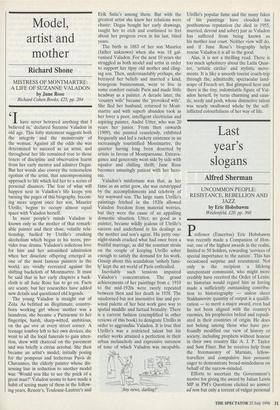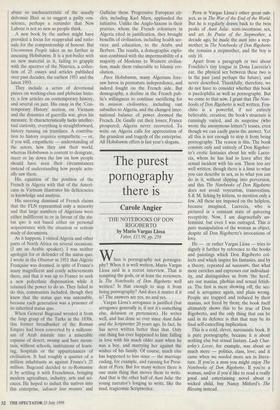Last year's slogans
Alfred Sherman
UNCOMMON PEOPLE: RESISTANCE, REBELLION AND JAZZ by Eric Hobsbawm Weidenfeld, £20, pp. 360 Pofessor (Emeritus) Eric Hobsbawm was recently made a Companion of Hon- our, one of the highest awards in the realm, limited to 50 holders, rewarding 'services of special importance to the nation'. This has occasioned surprise and resentment. Not only is the recipient a lifelong unrepentant communist, who might more credibly have received the Order of Lenin; no historian would regard him as having made a sufficiently outstanding contribu- tion to historiography — unless sheer Stakhanovite quantity of output is a qualifi- cation — to merit a major award, even had he not been aligned with the country's enemies, his prophecies belied and repudi- ated in their countries of origin. He does not belong among those who have pro- foundly modified our view of history or society, including prophets without honour in their own country like A. J. P. Taylor and Sam Finer. But he receives help from the freemasonry of Marxists, fellow- travellers and compulsive bien pensants eager to demonstrate broad-mindedness on behalf of the narrow-minded.
Efforts to ascertain the Government's motive for giving the award by Julian Lewis MP in PM's Questions elicited no answer ad rem but only a torrent of vulgar personal abuse so uncharacteristic of the usually debonair Blair as to suggest a guilty con- science, perhaps a reminder that New Labour is not so new as people think.
A new book by the author might have provided a focus for reappraisal and ratio- nale for the companionship of honour. But Uncommon People takes us no further in assessing Hobsbawm. It is a pot-boiler with no new material in it, failing to grapple with the spectres of the Nineties, a collec- tion of 25 essays and articles published over past decades, the earliest 1951 and the latest 1993.
They include a series of devotional pieces on working-class and plebeian histo- ry, a few articles on contemporary history, and several on jazz. His essay in the 'Con- temporary History' section, on Vietnam and the dynamics of guerrilla war, gives his measure. It characteristically lacks intellec- tual curiosity, everything is straightforward, history running on tramlines. A contribu- tion to history requires sympathetic — or, if you will, empathetic — understanding of the actors, how they saw their world, whereas Hobsbawm is content to denigrate, sneer or lay down the law on how people should have seen their circumstances instead of understanding how people actu- ally saw them.
His equation of the position of the French in Algeria with that of the Ameri- cans in Vietnam illustrates his deficiencies in knowledge and analysis.
His sneering dismissal of French claims that the FLN represented only a minority and that large numbers of Algerians were either indifferent to or in favour of the sta- tus quo is not based either on personal acquaintance with the situation or serious study of documents.
As it happens, I visited Algeria and other parts of North Africa on several occasions. (I am an Arabic speaker). I was neither apologist for or defender of the status quo. I wrote in the Observer in 1951 that Algerie Francaise was doomed, in spite of France's many magnificent and costly achievements there, and that it was up to France to seek a new polyethnic dispensation while it retained the power to do so. They failed to do this, communists included, though they knew that the status quo was untenable, because each generation was a prisoner of its inherited status quo.
When General Bugeaud wrested it from the limp grasp of the Turks in the 1830s, this former breadbasket of the Roman Empire had been converted by a millenni- um of Arab misrule into a miserable expanse of desert, swamp and bare moun- tain, without schools, institutions of learn- ing, hospitals or the appurtenances of civilisation. It had roughly a quarter of a million inhabitants as against France's 25 million. Bugeaud decided to re-Romanise it by settling it with Frenchmen, bringing modern agriculture, industry, arts and sci- ences. He hoped to induct the natives into this enterprise, `adoucir leur moeurs' and Gallicise them. Progressive European cir- cles, including Karl Marx, applauded the initiative. Unlike the Anglo-Saxons in their prairies, whom the French colonisers in Algeria cited in justification, they brought benefits of civilisation, including health ser- vices and education, to the Arabs and Berbers. The results, a demographic explo- sion combined with the impermeability of a majority of Moslems to Western civilisa- tion, made them vulnerable to Islamic rev- olution.
Pace Hobsbawm, many Algerians fore- saw havoc in premature independence, and indeed fought on the French side. But demography, a decline in the French pub- lic's willingness to continue sacrificing for its mission civilisatrice, including vast subsidies to Algeria, and the changed inter- national balance of power doomed the French. De Gaulle cut their losses; France prospered; Algeria never recovered. To write on Algeria calls for appreciation of the grandeur and tragedy of the enterprise. All Hobsbawm offers is last year's slogans.



























































 Previous page
Previous page